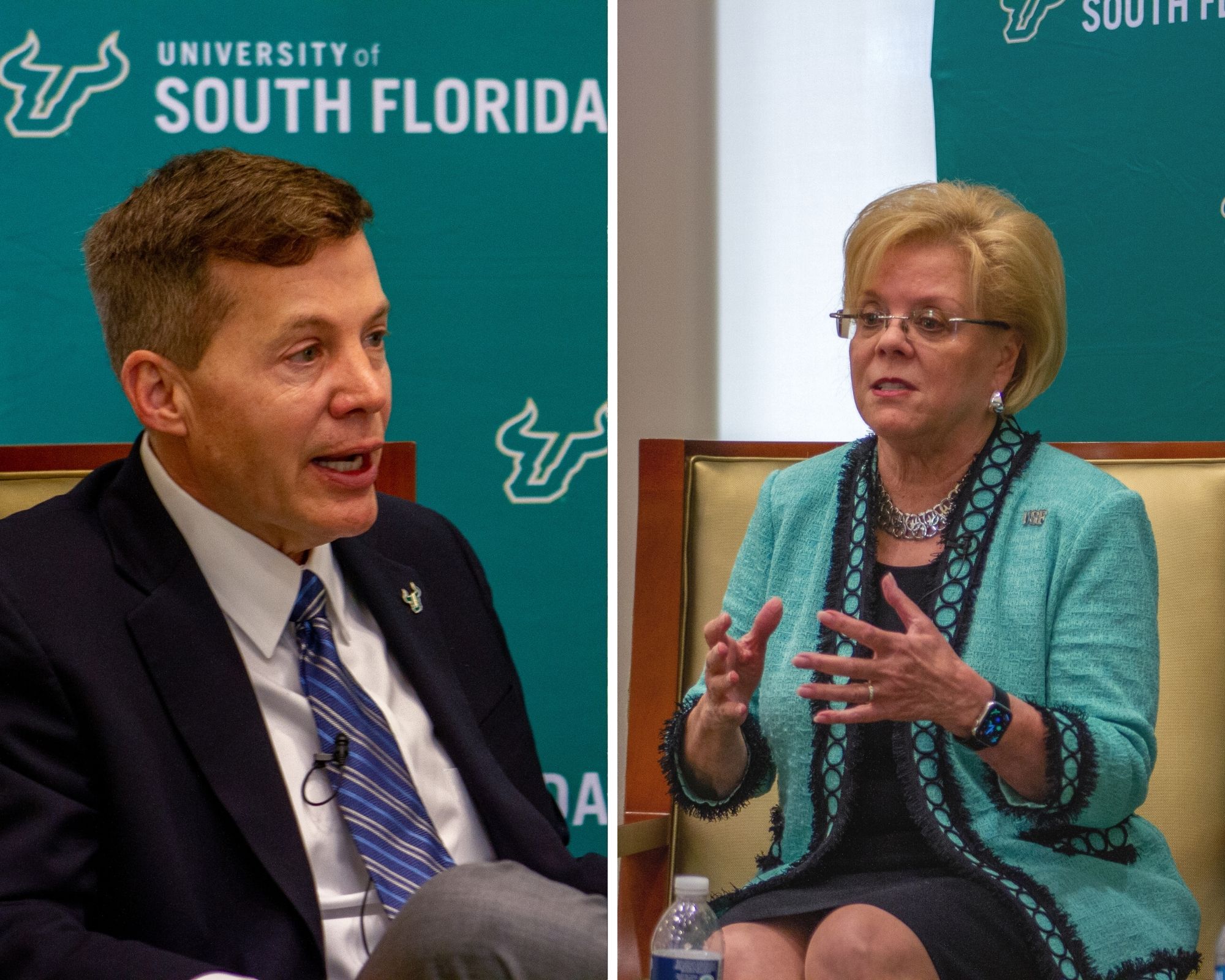Law, Talley visit campuses as presidential appointment nears

In a multi-campus series of town halls Monday, retired U.S. Army Lt. General Jeffrey Talley and Interim President Rhea Law echoed their statements on community concerns of USF’s future presented at their March 4 interviews with the Presidential Search Committee.
Students, faculty, staff and community members were able to submit questions on the search committee website, or on a note card at the town hall. However, they mirrored some of the questions presented at the interviews, resulting in similar responses.
No more than 35 people were in attendance at either Q&A-style town hall, hosted in Traditions Hall at the Alumni Center. Only a third of the room was made available for the event, though, not leaving much room for more attendees.
Talley kicked off at the Tampa campus at 9 a.m., reiterating the same “winning” vision he had expressed in his interview. Law ended her day in Tampa at 2 p.m. by highlighting the foundations of her leadership style — communication, collaboration and empowerment.
The No. 1 priority for Talley is ensuring all variations of diversity are welcomed at the university. He cited it as a requirement for equity among students.
USF is already doing an impressive job in housing diversity at the student level, especially with the university’s vast international enrollment, according to Talley. Yet, he made it clear that administration needs to mirror a proportional display of diversity.
“They need to be able to look up the senior leadership team and see people that look like them that have a similar background, just to show them that those barriers are not in place and they can literally be and do whatever they want,” Talley said.
Talley supported his claims with extensive examples about his efforts while in the army to increase administrative diversity, eliminating blanket all-white men leadership.
“I had 134 generals, and I looked at the most senior leaders, they’re a bunch of old white guys and I didn’t see any color or women,” he said. “I had [appointed] an African American commence sergeant major and I appointed the first Hispanic Chief of Staff in the history of the United States.”
The final question in Law’s town hall, asked by attendee and alum Samuel Wright, was driven by his concerns about the loss of inclusive progress at the university. He spoke more freely compared to the straightforward inquiries from the community.
Wright asked her to keep true progress in mind, as opposed to prioritizing high test scores and tuition from students and letting inclusion efforts slip between the cracks.
“I worked at the University of South Florida for 47.5 years. And when I was here there were very few students of color,” he said. “I worked to increase the diversity by knocking down doors, churches and communities in areas where maybe the university didn’t recruit students.”
Law focused her response to Wright’s worries on how her cabinet is one of the most diverse in USF’s history, and the university will continue to focus on expanding its outreach.
“I think [diversity] is extraordinarily important as it relates to recruiting students of color,” she said. “That’s why we’re reaching out to outside of the university to take our stories and to those on the outside and say, ‘This is what we’re recruiting. We need to do a better job of it.’”
The fourth pillar of Law’s five-year strategic plan, diversity and inclusion, would be achieved not only through the recruitment of students outside the USF community, but also in the hiring of a diversity, equity and inclusion vice president that would help achieve the plan’s desired goals, Law said.
Another leadership position needing to be filled by the incoming president is a successor of Provost Ralph Wilcox. Law mentioned a national search would be conducted to ensure the most qualified candidate can be found.
As discussed in Law’s March 4 interview with the search committee, her absence of a background in academia is a concern for her ability to lead a preeminent research university. To mitigate the shortcoming in her background, Law said she would only accept a provost that could provide her with strong academic oversight.
With USF’s aim to become a top-25 public university, having the appropriate funds to attract world-class scholars and athletes to the school is paramount, according to Talley.
Part of Talley’s vision for increasing USF’s budget is supporting the construction of an on-campus stadium. Talley said athletics are a vehicle to getting more donations that feed the university’s research and academic scholarships.
“My experience has [shown] increased gift-giving makes it easier to recruit faculty and staff and students,” he said. “There’s no downside … all that is done funnels back into some level of academics.”
The empowerment of research at the university is something Law will be actively supporting, as she said it is a foundational part of progressing the USF community in positive directions.
Law said she would create a program that will potentially be implemented in the future, as well as the hiring of a new vice president of research.
“Not only are we making it easy on the administrative side, but we’ll actually have training programs that will help them understand how you search for funding agencies and generate these ideas and really be successful in your grants applications,” she said.
At the end of the scheduled conversation, Talley opted out of providing his own closing remarks and was adamant that members of the audience should be able to ask a few questions. Time only allowed for one question, which circled back to how he would use athletics to increase school spirit among USF students and raise attendance rates at sporting events.
Talley said doing so would be as simple as the president making the time to interact with the students and get to know members of the student body.
“The president personally should be the biggest cheerleader for the university,” he said. “I would start by saying, ask the students. Let’s sit down with the student union and the student body and say ‘With what is it going to take to really engage students’ spirit on campus for athletic activities?’”
The candidates will be interviewed by the Board of Trustees on Tuesday, followed by a debriefing that will likely result in a president-elect being announced. The selection will then be subject to confirmation by the Florida Board of Governors.
Law expressed her motivations for wanting to fulfill the permanent position, citing how satisfying the position has been since she took it on in August.
“We can achieve that excellence that we’re talking about,” she said. “To come here and see the excitement, and see people really wanting to work together and achieve something better. I mean, this is the most fulfilling thing I’ve ever done. And I’d like to stay.”






